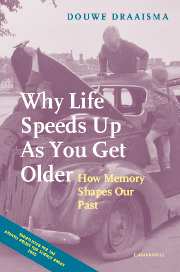Book contents
- Frontmatter
- Contents
- List of illustrations
- Acknowledgments
- 1 ‘Memory is like a dog that lies down where it pleases’
- 2 Flashes in the dark: first memories
- 3 Smell and memory
- 4 Yesterday's record
- 5 The inner flashbulb
- 6 ‘Why do we remember forwards and not backwards?’
- 7 The absolute memories of Funes and Sherashevsky
- 8 The advantages of a defect: the savant syndrome
- 9 The memory of a grandmaster: a conversation with Ton Sijbrands
- 10 Trauma and memory: the Demjanjuk case
- 11 Richard and Anna Wagner: forty-five years of married life
- 12 ‘In oval mirrors we drive around’: on experiencing a sense of déjà vu
- 13 Reminiscences
- 14 Why life speeds up as you get older
- 15 Forgetting
- 16 ‘I saw my life flash before me’
- 17 From memory – Portrait with Still Life
- Index of names
11 - Richard and Anna Wagner: forty-five years of married life
Published online by Cambridge University Press: 22 September 2009
- Frontmatter
- Contents
- List of illustrations
- Acknowledgments
- 1 ‘Memory is like a dog that lies down where it pleases’
- 2 Flashes in the dark: first memories
- 3 Smell and memory
- 4 Yesterday's record
- 5 The inner flashbulb
- 6 ‘Why do we remember forwards and not backwards?’
- 7 The absolute memories of Funes and Sherashevsky
- 8 The advantages of a defect: the savant syndrome
- 9 The memory of a grandmaster: a conversation with Ton Sijbrands
- 10 Trauma and memory: the Demjanjuk case
- 11 Richard and Anna Wagner: forty-five years of married life
- 12 ‘In oval mirrors we drive around’: on experiencing a sense of déjà vu
- 13 Reminiscences
- 14 Why life speeds up as you get older
- 15 Forgetting
- 16 ‘I saw my life flash before me’
- 17 From memory – Portrait with Still Life
- Index of names
Summary
Our memory does not really handle the daily round well. It is hard put to reconstruct unremarkable happenings, or the way voices used to sound, how things used to feel, how rooms smelled, the way food tasted. Or what your loved ones used to look like. Your parents in former days, your children when they were younger, your wife, husband, friends – by remaining close to you and changing imperceptibly and slowly, they have managed to expunge their past appearance from your memory. Even the transformation of your own looks eludes you: the face you see in the mirror today blurs the face you wore yesterday, let alone a month or a year ago.
If our appearance were a book, and if our memory were a bibliophile, then our memory would place each new edition next to the carefully preserved previous editions. We would be able to look at an early edition at our discretion and compare it with a later one and so tell what had been removed, added, scrapped, revised or corrected. Instead our memory is a tool designed for evolutionarily useful purposes, and that does not involve the collection of old editions. After all, if we cannot see our children as they used to look ten or twenty years ago, then there is no point in recalling their former appearance - so away with it!
We must forgive our memory for yet another reason.
- Type
- Chapter
- Information
- Why Life Speeds Up As You Get OlderHow Memory Shapes our Past, pp. 131 - 140Publisher: Cambridge University PressPrint publication year: 2004

